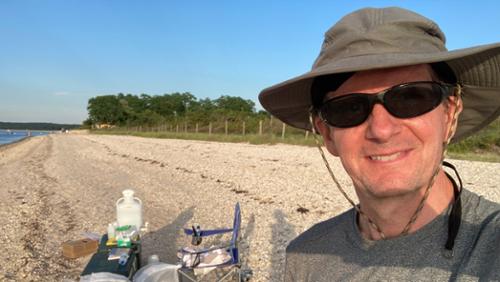All News
-
In the summer of 2022, Professor of Biology Mike McCormick began research on a green beach in Long Island, N.Y.
Topic -
Members of the Hamilton community gathered to hear Dr. Michael Dorsey’s lecture, “Pathways Beyond Paris: Toward Energy & Climate Justice” on Feb. 4. Dorsey is the interim director for the Joint Center of Political and Economic Studies in Washington, D.C.
Topic -
Eugene Domack, the Joel W. Johnson Professor of Environmental Studies, will present the lecture “400 parts per Million of CO2, and why Earth History Matters,” on Wednesday, Sept. 18, at 7:30 p.m., in the Chapel. The lecture is free and open to the public.
Topic -
New Scientist magazine quoted Ernest Williams, the William R. Kenan Professor of Biology, in “The chilly secret to monarch migration,” an article that examined possible trigger prompting these butterflies to leave the warmth of Mexico to travel to the United States in the spring. In the Feb. 17 article, Williams commented on how warming temperatures might change migration patterns.
Topic -
An All Things Considered report on National Public Radio that focused on the upside of Iowa’s drought last summer included an interview with Ann Owen, the Henry Platt Bristol Professor of Economics. In “The Silver Lining In Drought: 5 Upsides To Rain-Free Weather,” Owen discussed the study, “Heat Waves, Droughts, and Preferences for Environmental Policy,” that she co-authored with Assistant Professor of Economics Emily Conover, Associate Professor of Economics Julio Videras and Professor of Economics Stephen Wu.
Topic -
Research conducted on a 57-day expedition along the Antarctic Peninsula in 2010 led by Eugene Domack, the J.W. Johnson Family Professor of Geosciences, was the focus of a Dec. 12 article in the journal Nature. “Polar research: Trouble bares its claws” provided an overview of the changing ecological balance in the waters off Antarctica due to warming waters, highlighting Domack’s measurement of temperature changes during the last three decades.
Topic -
Hamilton students are now pursuing their studies on all seven continents. On Oct. 10, Chief Scientist Eugene Domack, the J. W. Johnson Family Professorship of Environmental Studies, began an 18-day cruise to Antarctica along with two Hamilton students and two alumni. Students are writing blog updates about their trip each day.
Topic -
Using examples from today’s political landscape, Professor of Government P. Gary Wyckoff examined elements of critical thinking in an essay titled “What Exactly Is Critical Thinking,” published by InsideHigherEd in its Oct. 11 edition. “As I prepared for the start of classes this fall, I tried to pinpoint the critical thinking skills I really want my students to learn,” wrote Wyckoff. “And as I listened to public debates on everything from tax policy to Obamacare, five essential thinking skills seemed to be missing, again and again.”
Topic -
National Public Radio science reporter Richard Harris interviewed Eugene Domack, the Joel W. Johnson Family Professor of Geosciences, for a segment on All Things Considered on Aug. 22 titled “Humans’ Role In Antarctic Ice Melt Is Unclear.” Domack’s research, published in the journal Nature in 2005, provided evidence that the break-up of Antarctica’s Larsen B ice shelf was caused by a combination of long-term thinning over thousands of years and short term cumulative increases in surface air temperature that have exceeded the natural variation of regional climate during the Holocene period.
Topic -
"Witness to an Antarctic Meltdown - Scientists Trek to Collapsing Glaciers to Assess Antarctica’s Meltdown and Sea-Level Rise," an article that appeared in the Scientific American’s July issue, focused on research performed during the 2010 LARISSA (LARsen Ice Shelf System, Antarctica) expedition for which Hamilton Geosciences Professor Eugene Domack served as Principal Investigator. Writer Douglas Fox, who accompanied the 30 scientists on the two-month expedition, described the researchers’ efforts to determine how fast the continent is melting and what that might mean for sea-level rise.
Topic



